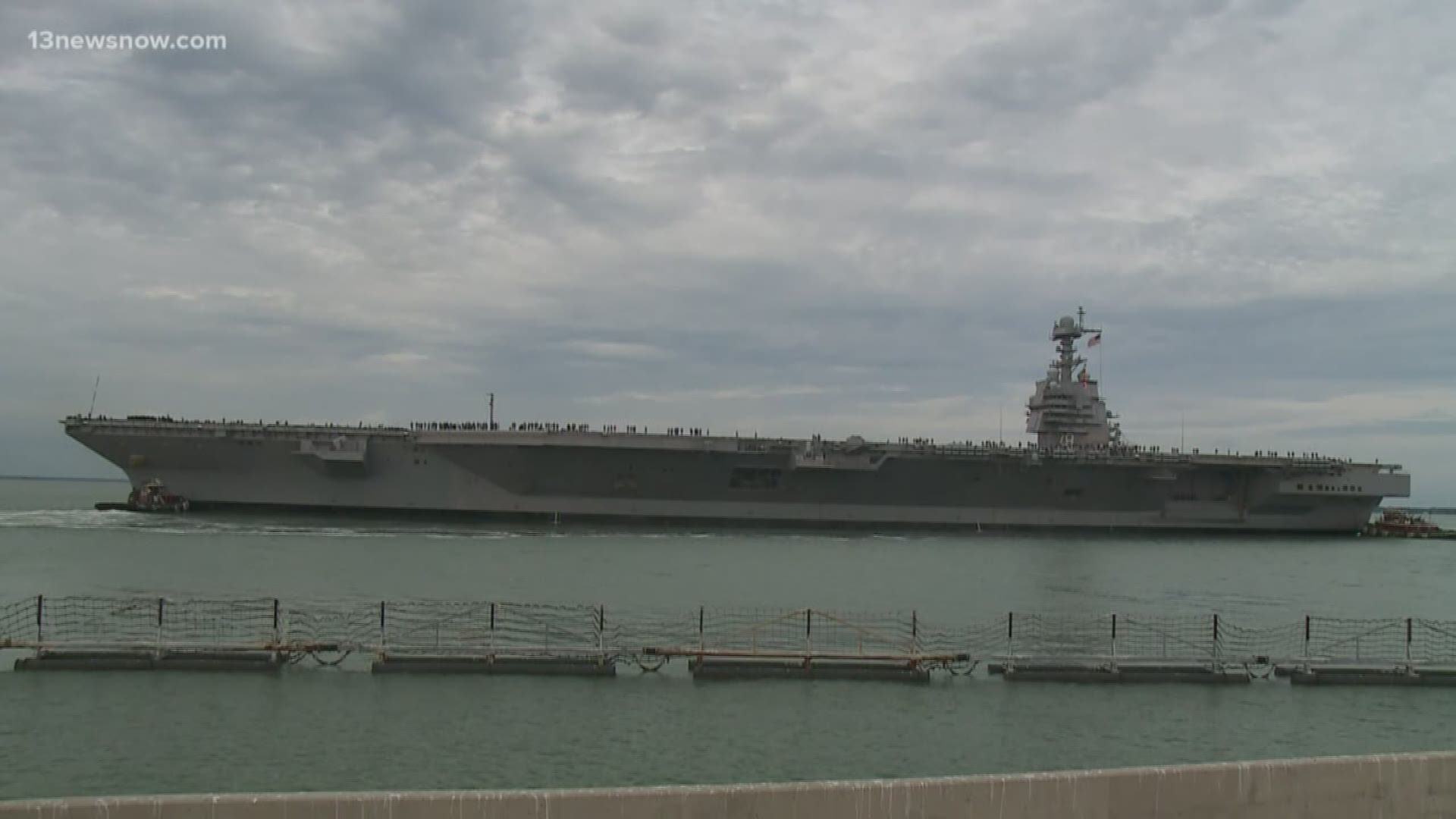NEWPORT NEWS, Va. — In recent weeks, things had started looking up for the USS Gerald R. Ford, most notably, with the successful execution of aircraft compatibility testing last month in the Atlantic.
Three years after its commissioning, the Ford has endured a seemingly endless list of problems involving the poor or unknown reliability of systems essential for flight operations, including newly designed catapults, arresting gear, weapons elevators, and radar.
But a report from the Department of Defense Office of the Director of Operational Test and Evaluation raises new concerns about the $12.9 billion warship.
In the report, the Ford faces questions about its ability to defend itself and its crew of more than 4,700 embarked personnel. The report found combat system deficiencies and limitations associated with three important combat systems: the electronic warfare system, the multi-function radar, and the Cooperative Engagement Capabilities.
The document concludes: "These deficiencies and limitations reduce the overall self-defense capability of the ship."
It is worth noting that the Navy conducted only one of the four planned self-defense tests, not aboard the Ford, but aboard a test ship.
13News Now reached out to Newport News Shipbuilding, which referred us to the Navy.
In a statement, William M. Couch, spokesman for Naval Sea Systems Command Office of Corporate Communication said, "USS Gerald R. Ford continues to progress in a series of rigorous test events to demonstrate the effectiveness of the ship’s combat system in ship self-defense, as well as in testing and certification on a number of other systems during the current 18-month phase of operations known as Post-Delivery Test and Trials (PDT&T). During PDT&T, the crew certifies fuel systems, conducts aircraft compatibility testing, exercises the flight deck and tests the on-board combat systems."
Couch concluded: "To date, the Navy has conducted more test events on USS Gerald R. Ford than on any previous aircraft carrier. The Navy plans to execute additional developmental and operational tests on CVN 78 over the next 15 months as the ship prepares for Combat System Ship Qualification Trials in 2021. The ship is planned to complete final ship self-defense testing on schedule in 2023.."
Members of Congress are weighing in.
Rep. Elaine Luria (VA-02) said, "I have been closely following the Commander of the Operational Test and Evaluation Force report on the FORD's combat system performance. This is another example of one of the critical warfighting systems being installed before the technology is mature and tested—something the Navy is well aware of and threatens the ship's readiness for first deployment. The Secretary of the Navy has stated that preparing FORD for deployment is his top priority, so I expect that he will make the necessary changes to the Self Defense Test Ship schedule to thoroughly test the Multi-Function Radar and make corrections promptly. Additionally, interoperability between components of the FORD's combat system is a symptom of long standing issues on our ships—and I am prepared to work with the Navy to improve this situation."
Senator Tim Kaine said, "I was concerned to see the reports detailing unknown reliability and capability shortfalls with some of the systems aboard the USS Gerald R. Ford. In building a first-in-class ship, it's not uncommon to experience delays. Many of these systems are going through their planned testing phases so that these deficiencies can be found and improved upon before the ship deploys. It's crucial that these issues are fixed quickly."
Finally, Senator Mark Warner said, "I continue to monitor schedule delays and performance concerns with the Ford class, but this report should come as no surprise. For the first-in-class of aircraft carriers, we can expect these kinds of testing difficulties, especially in the first round of operational testing. I know that senior leadership at the Navy and industry are committed to working through challenges to ensure Ford is fully operational and meets the highest standards. I will continue following progress across all fronts, and look forward to seeing the results of future testing by the Navy."

